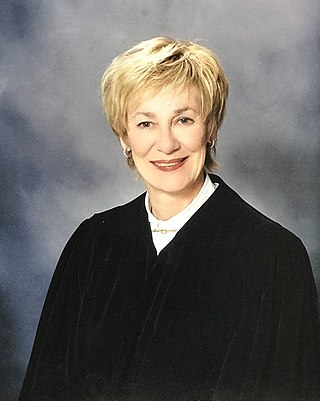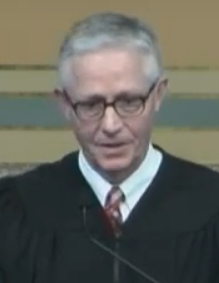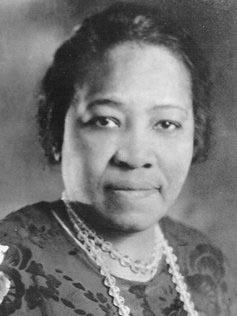Related Research Articles

Des Moines University (DMU) is a private medical school in West Des Moines, Iowa. Founded in 1898, Des Moines University is the second oldest osteopathic medical school and the fifteenth largest medical school in the United States. DMU's three colleges—the College of Osteopathic Medicine, College of Podiatric Medicine and Surgery, and College of Health Sciences—offer nine academic degrees, including master's and doctorate degrees.

The National Bar Association (NBA) was founded in 1925 and is the nation's oldest and largest national network of predominantly African-American attorneys and judges. It represents the interests of approximately 67,000 lawyers, judges, law professors, and law students.

Arabella Mansfield, born Belle Aurelia Babb, became the first female lawyer in the United States in 1869, admitted to the Iowa bar; she made her career as a college educator and administrator. Despite an Iowa state law restricting the bar exam to males, Mansfield had taken it and earned high scores. Shortly after her court challenge, Iowa amended its licensing statute and became the first state to accept women and minorities into its bar.

Mahala Ashley Dickerson was an American lawyer and civil rights advocate for women and minorities. In 1948 she became the first African American female attorney admitted to the Alabama State Bar; in 1951 she was the second African American woman admitted to the Indiana bar; and in 1959 she was Alaska's first African American attorney. In 1983 Dickerson was the first African American to be elected president of the National Association of Women Lawyers. Her long legal career also helped to pave the way for other women attorneys. In 1995 the American Bar Association named her a Margaret Brent Women Lawyers of Achievement honoree.

Joseph Clemens Howard Sr. was the first African American to win an election as judge for the Baltimore City Supreme Bench and was later appointed by President Jimmy Carter to be a United States district judge of the United States District Court for the District of Maryland, becoming the first African American to serve on that bench as well.

Linda Rae Reade is a senior United States district judge of the United States District Court for the Northern District of Iowa.

Mark Steven Cady was an American jurist. He served on the Iowa Supreme Court for 21 years from 1998 to 2019. From 2011 to 2019, he was the chief justice of the court. He was the author of the court's opinion in Varnum v. Brien, which legalized same-sex marriage in Iowa.

Louise Frankel Rosenfield Noun was a feminist, social activist, philanthropist, and civil libertarian.
Willie Stevenson Glanton was an American lawyer and politician in the state of Iowa. She toured Africa and Southeast Asia for the U.S. State Department. She was a Democrat.

Chester Cicero Cole was a justice of the Iowa Supreme Court from March 1, 1864 to January 19, 1876 appointed from Polk County, Iowa. He became chief justice in 1869. Cole was a founder of both Iowa law schools.

Women in law describes the role played by women in the legal profession and related occupations, which includes lawyers, paralegals, prosecutors, judges, legal scholars, law professors and law school deans.
Leona Pouncey Thurman (1911–1985) was an American attorney who became Kansas City, Missouri's first African American female lawyer. She was also Missouri's first African American female lawyer to practice before the Supreme Court of the United States.
Angela Onwuachi-Willig is an American legal scholar. She is dean and professor of law at Boston University School of Law and an expert in critical race theory, employment discrimination, and family law. She took the position in August 2018, having previously been the Chancellor's Professor of Law at the University of California, Berkeley.

Sue M. Wilson Brown was an African-American activist for women's suffrage. She was inducted into the Iowa Women's Hall of Fame in 1995.

Women's suffrage in Iowa efforts began early in Iowa's history. During the territory's Constitutional Convention, discussions on both African American and women's suffrage took place. Early on, women's rights were discussed in the state by women such as Amelia Bloomer and petitions for suffrage were sent to the Iowa state legislature. While African American men earned the right to vote in 1868, women from all backgrounds had to continue to agitate for enfranchisement. One of the first suffrage groups was formed in Dubuque in 1869. Not long after, a state suffrage convention was held in Mount Pleasant in 1870. Iowa suffragists focused on organizing and lobbying the state legislature. In 1894, women gained the right to vote on municipal bond and tax issues and also in school elections. These rights were immediately utilized by women who turned out in good numbers to vote on these issues. By the 1910s, the state legislature finally passed in successive sessions a women's suffrage amendment to the state constitution. This resulted in a voter referendum to be held on the issue on June 5, 1916. The campaign included anti-suffrage agitation from liquor interests who claimed that women's suffrage would cause higher taxes. The amendment was defeated, though a subsequent investigation turned up a large amount of fraud. However, the election could not be invalidated and women had to wait to vote. On July 2, 1919, Iowa became the tenth state to ratify the Nineteenth Amendment.
Deborah Ann Turner is an American physician who is the 20th and current president of the League of Women Voters of the United States (LWVUS) and also the chair of the Board of Trustees of the League of Women Voters Education Fund (LWVEF). She was elected board president at the League of Women Voters 54th National Convention in June 2020 and will continue in this position until at least June 2022.
References
- ↑ J. Clay Smith, Jr., Thurgood Marshall (1999). Emancipation: The Making of the Black Lawyer, 1844–1944. University of Pennsylvania Press, ISBN 978-0-8122-1685-1
- ↑ Warwick, Judy (1994). "Rush, Gertrude E. Durden". Black Women in America: An Historical Encyclopedia. Bloomington: Indiana University Press. p. 997. ISBN 0-253-32774-1.